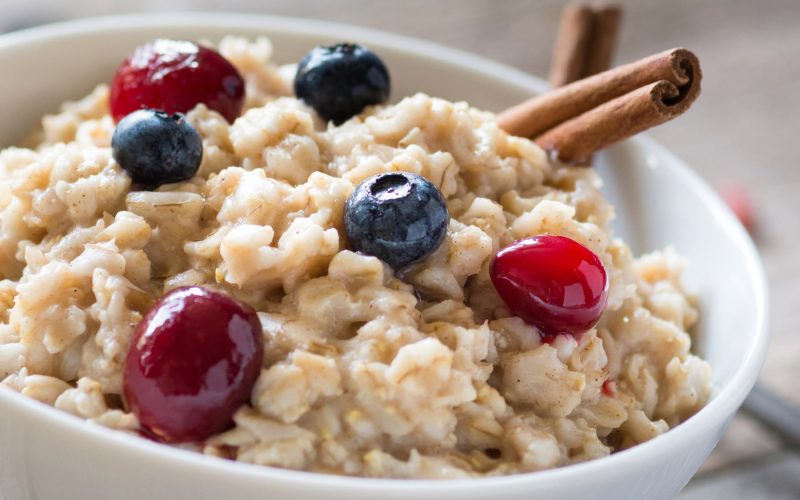Oatmeal is a hot cereal, which can be gotten from broken-down oat groats. People consume it when mixed with hot water or milk to give it a creamy and pleasant density.
Individuals with diabetes have to be conscious of foods with high carbohydrates because they quickly disintegrate into sugars.
This could cause an increased level of glucose and insulin in the blood, and it’s among the reason people with diabetes often go for alternatives to carb-rich cereals.
Oatmeal from whole grain oats might be a beneficial addition to a person’s diet with diabetes. It has a low GI score, and the soluble fibre and the healthy blends in oats could help people regulate diabetes markers.
Health benefits of oatmeal for people with diabetes
Oatmeal may have many benefits for people with diabetes, regardless of it is being a high-carb food. These benefits include the following:
Low GI score
The glycemic index (GI) estimates how foods will increase the blood glucose level. The blood glucose level rises with an increased glycemic index number, and foods having lower GI scores are excellent for keeping the blood sugar stable.
These foods will generally not increase blood glucose as far or as quickly as high-GI foods.
Oat foods that include oatmeal and muesli, which are made from steel-cut or rolled oats, are low-GI foods, with a GI score below 55. Other breakfast cereals like puffed rice or corn flakes have a GI number of above 70.
Fibre-rich
Fibre plays a significant part in digestion, particularly in individuals with diabetes. Dietary fibre might help slow down the decomposition of sugars in the body.
This could assist in preventing surges in blood glucose and insulin levels. Consuming fibre-rich foods like oatmeal during the day might make it easier for people with diabetes to maintain their blood sugar levels.
The American Diabetes Foundation disclosed that adults should consume at least 25 – 30 grams (g) of fibre a day, but most adults do not eat up to this amount. A portion of oatmeal adds 8g of fibre to the diet, making it a lot easier to meet the dietary recommendations.
Lower blood sugar
Oats are special because they comprise certain types of fibres known as beta-glucans.
A standardized review published in the journal Nutricion Hospitalaria discovered that consuming beta-glucans was enough to lower the blood glucose levels in people with diabetes.
The study pointed out that this wouldn’t help the blood glucose levels attain normal levels, but it might be a useful supplement to other healthy diabetes treatments.
Keeps the heart-healthy
People with diabetes may also require means of regulating other conditions like high cholesterol. Oats may be particularly beneficial to them because of the healthy beta-glucans it contains.
Following a study published by the American Journal of Clinical Nutrition, including three or more grams of beta-glucans from oats to a diet helps reduce bad cholesterol levels while maintaining good cholesterol levels.
It makes a person feel full
Fibre-rich foods such as oatmeal might also help keep the body feeling satisfied for an extended period. This could make it more comfortable for people with diabetes to avoid eating snacks during the day, helping them balance their blood sugar level.
Feeling full may also help a few people keep their entire daily calories at a minimum level, helping them maintain their weight or lose extra weight.
Temporary increase in insulin sensitivity
Consuming oats might help improve insulin sensitivity in every meal. A standardized review published in the journal Nutrients pointed out that individuals with type 2 diabetes who consumed a meal of oatmeal had a better glucose and insulin response than people who didn’t.
It is crucial to know that this is a reasonable change, and simply including oats in your diet is not enough to permanently enhance your insulin sensitivity.
Nutritional content
There are several ways to make oatmeal, but the most basic method of preparing oatmeal is when oats are cooked in hot water.
As mentioned by the United States Department of Agriculture (USDA) National Nutrient Database, the normal portion size of 1/2 cup of oats incorporate the following nutrient profile:
- Protein: 13 g
- Carbohydrates: 52 g
- Fats: 5 g
- Total fiber: 8 g
- Calories: 304
Oats also contain beneficial minerals like:
- Potassium: 335
- Calcium: 42 milligrams (mg)
- Magnesium: 138 mg
- Phosphorous: 408 mg
- Iron: 4 mg
- Zinc: 3 mg
Oats are generally low in sodium and sugars. This may be beneficial to people with diabetes who are looking for a more healthy choice of food.
In line with these numbers above, oatmeal is still mainly a source of carbohydrates. People who use carb counting to help them control their blood sugar might not like what they notice at first because 52 grams of carbohydrates is still quite an amount.
Nonetheless, it is crucial to consider that nearly 8 of these grams are in dietary fibre, which could help prevent glucose surges in the blood. It is important to consume oats in moderation and obey an appropriate meal plan for diabetic patients.
Dietary tips
Oatmeal can be a tasty and nourishing addition to sweet and savory meals, but it is crucial to consume the whole oatmeal to get all the nourishment.
Basic oatmeal
Oatmeal, in its basic form, is just oats and water. This might be healthy, but it is also bland. Fortunately, there are some safe means of adding flavour to simple oatmeal and make it more desirable.
These includes:
- Spices: Cinnamon is a sweet spice that pulls out the oats’ earthy flavors, making the meal more delightful.
- Sweeteners: A few people make use of sweeteners like sucralose, stevia, or monk fruit to add flavour to the oatmeal.
- Milk: a handful of people cut back on oats and replace those carbohydrates with milk by blending it with the water while cooking or including it at the end.
- Fruit and nuts: Crushed nuts or blueberries can add texture and flavour to the oatmeal.
Bread products
Processed white bread is inappropriate for people with diabetes. However, some bread selections have reasonable GI scores because they contain whole grains as well as fibre.
The bread that contains oats might be within scope for people with diabetes. For people who wish to prepare their healthy bread, pancakes, or muffins, including oats in the recipe can be a good starting point.
Smoothies
A freshly prepared oatmeal can make the perfect combo with a smoothie for breakfast. It gives useful fibres and provides extra thickness. This could help the person feel a lot more satisfied and active during the day.
Dangers
The risks of consuming oatmeal are primarily insignificant, but people should be familiar with certain things when choosing them.
These includes:
- Allergies: a handful of oats may be polluted with wheat gluten or other flours. A person with possible allergens should go for certified gluten-free oats.
- Minor side effects: Excess fibre could result in minor side effects such as gas and bloating.
- Added ingredients: Oats and muesli that comprises added ingredients could be unhealthy for people with diabetes, particularly if they contain dried fruits or added sugars. Ensure that you check the labels and look out for whole grain oats.
- High carbs content: Oatmeal has a high carbohydrate content, and people with diabetes should consume it in moderation.
- Gastroparesis: People with gastroparesis might want to avoid eating oats because it could worsen their condition symptoms.
Oatmeal vs. instant oatmeal
It is crucial to know that whole grain oats provide the most nutritional value. Rolled or steel-cut whole-grain oats conserve all the fibre and nutrients that make oatmeal so helpful. In this manner, instant oatmeal isn’t the same as oatmeal from whole grain oats.
Several instant oatmeal varieties blend oats and flours that contain added sugar and have had their fibres removed. Oatmeal, in this instant manner, is a high GI food, and it may increase the blood sugar rapidly. When selecting oats, ensure you go for whole-grain rolled or steel-cut oats and avoid instant oats packages.
Oats can be a healthy regular addition to a diet for people with diabetes when consumed in moderation. Nonetheless, there is no standard diet for diabetes, and people need to monitor their blood sugar levels when consuming oats to determine if they are the right choice.
Rolled or steel-cut whole grain oats are the best, and make sure that you watch for any included ingredients before purchasing any oatmeal product.
Oats are healthy, but they are not the diabetes treatment. They could help manage symptoms when included in a diabetic meal plan, but it can’t replace a proper medical procedure for diabetes.
Reference;
- Is oatmeal good for people with diabetes?– MedicalNewsToday
- Oatmeal and Diabetes – Healthline





